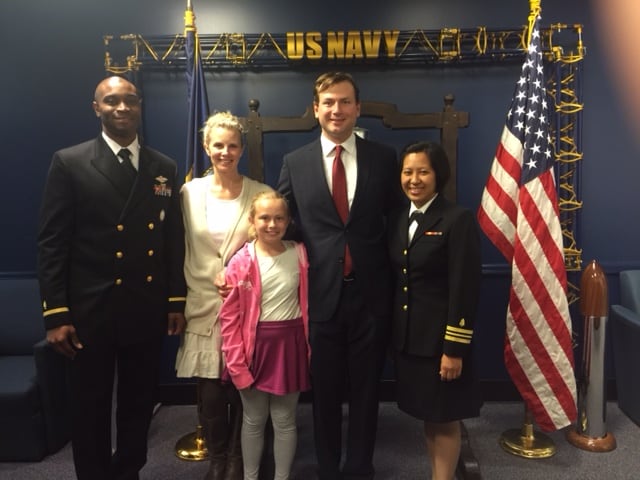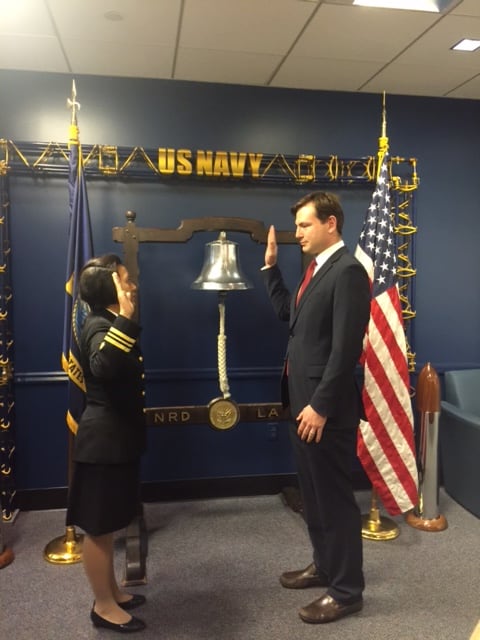"Parenthood" painted life in its truest form, which is why it was interesting to see one of its actresses share a personal change in her life as if it could have been a plot line within the show.
A week after the series finale, Golden Globe-nominated actress Monica Potter ("Along Came a Spider," "Patch Adams") posted photos to her Twitter account that her husband, Dr. Daniel C. Allison, an orthopedic surgeon at Cedars-Sinai Medical Center in Los Angles, joined the Navy Reserve in the last year that is allowed under military regulations regarding age.
Military Times talked to the duo about their upcoming transition into military life, their expectations and goals, and what motivated Dr. Allison to become a Navy officer.
Q. Let me start by saying congratulations. Full disclosure, I am biased toward the naval service as a former Marine, so you picked the right one.
Dr. A. Thank you. I am really excited. I am so happy I made this decision. It was a long process, but I am so happy it went through.

Husband of "Parenthood" star Monica Potter, orthopedic surgeon Dr. Daniel C. Allison joined the Navy Reserve in his final year of eligibility. He hopes to deploy overseas and apply techniques that if done early on could improve outcomes in trauma patients.
Photo Credit: Courtesy of Monica Potter
Q. Has this been a goal of yours for some time now?
Dr. A. Yes, for quite a while, but there are always reasons not to join. I was just starting to practice medicine and this, that and the other, but you know, a lot of the injuries overseas are orthopedic with the body armor — I think it's like 85 percent — and in our academy of orthopedic surgeons we had some of the military surgeons come and talk to us about amputations and the way they optimize things, but they indicated to us that there was a need for more surgeons.
I am starting at O-4, so I will be a lieutenant commander, and it's probably way more than I deserve, but that's where they have me. Then I will go to officer training school in Newport, Rhode Island, sometime in the next six months for a few weeks, and then I will go do my drills — two days a month, two weeks a year — then after a few years, I will be ready to deploy as needed.
Q. How did you come to this decision in your marriage?
Dr. A. I always thought about it since I was in residency. A friend of mine who is a Navy commander, Matt Camuso, gave a big talk when he came back from Fallujah, Iraq, and one story that really stuck with me was a Marine that he had performed an amputation on after an IED incident. He came in to check on him the next day and ... saw the Marine doing pushups with his three limbs, his amputated limb supported by his other leg, and the Marine told Camuso, "I have to get back out there to my guys." That story just blew me away.
M.P. I feel like the people in politics making up the rules should spend some time in the military to know what our kids go through, and what upsets me is when I see veterans ignored. We are big supporters of the Wounded Warrior Project, so we love everything about our troops, so I think that kind of pushed him into joining. I mean, he can't wait to get through training so he can start helping.
Q. Are you looking to deploy to some place like Iraq or Afghanistan?
Dr. A. Wherever they need me. I have a lot of trauma experience from L.A. County, and then I went into orthopic oncology, which is cancer in the pelvis and extremities. So I deal with a lot of limb salvage cases or in some cases amputations where I am trying to make the best of a bad situation with large defects, which plays into some of the IED injuries.
Q. [To Potter] Are you nervous about the possibility of him deploying?
M.P. Wherever he wants to go, I will support it. I had a friend ask me today what I was thinking, and I told her ... this is his decision.
I mean, at first I was like, 'You have a kid and a wife,' but ultimately these are his dreams and goals. I have things that are crazy, and he supports me, so I need to support him.
But I would rather him go than my boys.
Q. Do you agree?
Dr. A. Absolutely. One of the big things I saw is corpsmen training at 18, 19 years old, then going over there to fight for us and keep these threats from reaching our homeland.
To me, it doesn't seem fair that I am older and getting to enjoy all the luxuries of American life without helping in some way … I don't know how much I can do, but at least [doing] something will make me feel better.

Dr. Daniel C. Allison is an orthopedic surgeon at Cedars-Sinai Medical Center in Los Angles and husband of "Parenthood" star Monica Potter. Dr. Allison joined the Navy Reserve to help with combat injuries.
Photo Credit: Courtesy of Monica Potter
Q. What do your kids think of you going into the Navy?
Dr. A. They are really supportive, which is great. I don't think my youngest daughter understands it. But I haven't gone too far into it with her. I have just told her I am trying to help, and she likes that. She did mention that in two years, when I am ready to deploy, she will be 11 years old, so she's worried that I won't be around a lot. But I tell her it's temporary and a lot of other families go through it as well.
M.P. But she's very excited for him. She wants to visit Camp Pendleton [California] and see all the bases, and so do the boys. They are very proud of their stepdad. It will be an interesting journey — he is so humble. Plus, it's the reserves, so he's not leaving tomorrow to go overseas. But I know he might have to do that for six months or a year, and we will deal with that when it comes.
Q. What are you looking to accomplish in the Navy?
Dr. A. I will go wherever they need me … but on the forward operating bases it's really about controlling damage. When someone comes in, you can't necessarily make them perfect right away. It's about stabilizing … you're just getting them ready for transport. The next step is in Germany, where you're taking care of complex fractures and finishing amputations and saving limbs, moving on to Walter Reed for more rehabilitation, and then there's the Center for the Intrepid in San Antonio, Texas, which is Quaternary Care [where patients receive specialized medical treatment]. So I can serve within any of those four stages. But if I had my choice, it would be in country or Germany because there are some techniques I have picked up that if performed early on can help optimize things down the road.
Q. Is there anything that you have learned as a civilian surgeon that you could bring to military medicine?
Dr. A. One case here in America that's been performed ... is a procedure called bone anchor cross prosthesis for above-the-knee amputations. We insert a device that's connected to your skeleton, which comes out through your skin and then connects to an external prosthesis, and it's revolutionizing above-the-knee amputations. After the procedure, we have seen people rock climbing, especially with today's modern technology. The procedure was done here in America by a former Navy corpsman, Tim McTighe. The technology has not yet been approved by the Food and Drug Administration for use in the U.S., but the procedure is extensively used in Europe.
Q. Is there a reason this has not been approved yet? Is it a question of cost?
Dr. A. It's an FDA approval issue. I don't think the cost will be a problem.
Actually, one of our people in our tumor society, Lor Randall, at the Huntsman Institute in Utah, got a big DoD grant, which I heard was upwards of $3 million dollars, to study the issue at the basic science level, which is not the level where we can start implementing this technology into patients. But given the fact that the procedure has had all of this success outside the U.S., I don't think we should waste time studying it. We can start helping patients now. So money is not the issue; it's the FDA.
Q. Does your job take a toll on you personally, and is it hard to keep your work and home lives separate?
Dr. A. There are times, yes, especially with cancer patients and those in extreme trauma. It's the hardest when things don't go well, when you've got someone on death's doorstep, and you feel like you're a part of turning that around. When it doesn't turn out great, you wonder if you could have done something differently, so it's hard to shake that, and it's not something you can always explain to the family at home, so that's challenging.
Q. Do you think there is a difference in the way traumatic events will impact you as far as what you have witnessed in the States compared to what you might potentially see in a war zone?
Dr. A. I am respectful of the fact that I don't know because I have not been there, but I feel like some of the things I have seen and dealt with have prepared me somewhat. You develop basic defense mechanisms for starters, but I know I won't be able to truly understand what war is like until I am there.
Q. How do you think your wife's transition to military spouse will be?
Dr. A. I don't know. I can see that she's proud — she's more proud of this than anything I have ever done. She's really great, so that means I have to work harder, but I know it's going to be a lot on her, especially when I am away. But she's very strong. I think she's nervous about the unknowns, but she's also unwavering in her support. She's a strong Irish woman.
M.P. [Laughs] I think every woman, wife, mom is strong. I think as I get older, I have realized that you can't always control things … you just have to support and help your partner get to the place where they want to be in life. That's what you sign up for when you get married. I believe in his decision. When he was taking his oath the other day, I thought to myself, "Whoa, this just got real," and I started to get choked up because I was so proud of him. But honestly, I don't know how my transition will be. I mean, do we have to live on the base? [Laughter] I look forward to meeting other military families because I have a lot of questions. I'll definitely be reaching out to those wives who have been through a deployment.





